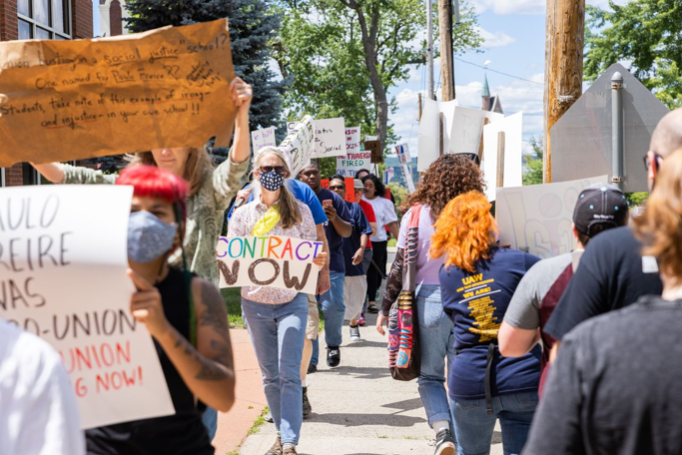
Union fever is spreading like wildfire among the state’s cannabis workers even though the adult use recreational market has yet to open up.
The workers prepping for that day say they want careers, not just jobs, and that’s spurring union drives throughout New Jersey.
Earlier this month nearly two dozen budtenders (the job title for those who help customers at marijuana dispensaries) at Ascend Montclair Dispensary signed a new three-year contract offering health benefits and wage increases.
But they won’t be the only ones for long, predict those who are leading the charge to get cannabis workers unionized.
“From budtenders to cultivators, to trimmers — cannabis workers will be pursuing union representation not only in New Jersey, but around the nation,” said Hugh Giordano, cannabis representative of United Food and Commercial Workers (UFCW) Local 360, which represents a large majority of cultivation and dispensary workers in the state.
“Cannabis workers rising together as one voice, allows the Industry to grow with its workforce — whether that voice speaks in regards to economic justice such as fair wages and benefits; or social justice, in making sure people of color, LGBTQ, women, and other marginalized communities have a seat at the table,” added Giordano.
The UFCW represents Garden State Dispensary, which was one of the first cannabis facilities to go union in 2016. After that first contract, Giordano said other alternative treatment centers and cultivation sites, including Verano, GTI and Ascend, started reaching out. His union is currently negotiating contracts on their workers’ behalf.
“The UFCW believes that cannabis careers are a skilled profession, and many workers want the opportunity to create long term stability,” Giordano said. “… Like any other Industry, cannabis is on its way to be a global commodity, and workers see the writing on the wall. The UFCW has been steadfast in making sure workers are a priority, and a union contract does just that.”
The New Jersey Cannabis Regulatory Commission, the entity charged with regulating the new industry, is still reviewing applications for licenses, and is likely to miss a Feb. 22 targeted deadline to open the state for adult use cannabis.
The CRC contends applications from eight alternative treatment centers are incomplete and lack municipal approvals.
Despite the delay, union drives are moving full speed ahead.
The 22 budtenders at the Montclair, Essex County facility ratified their first union contract ever on Feb. 4. The three-year labor agreement provides significant wage increases and benefits for the budtenders.
The contract was negotiated by Cannabis Engineers Extractors & Distributors (CEED) Local 420, of the International Union of Journeymen of Allied Trades. The IUJAT was established solely to represent cannabis workers in New Jersey.
The contract provides annual 3 percent wage increases, access to better health benefits, a schedule allowing workers with seniority more time off, and provision allowing workers say in working conditions.
In addition, if Ascend is awarded any future license for recreational cannabis operations, the contract can be re-opened with regard to wages.
Rob Mejia, Adjunct Professor at Stockton University in the cannabis studies department said, the three-year contract is symbolic.
“The unionization of cannabis workers in Ascend in Montclair is getting a lot of coverage but our first cannabis union in New Jersey was formed back in 2018 at Garden State Dispensary,” Mejia told NJ Cannabis Insider.
Mejia said there is a huge incentive to unionize when applying for a license to sell adult recreational cannabis with the state – a process that’s well underway.
“When scoring applications, the New Jersey Cannabis Regulatory Commission gives priority to businesses which have, or will have, a collective bargaining agreement in place with a bona fide labor organization,” Mejia explained.
“This is just another example of cannabis in New Jersey being normalized,” said Mejia. “Cannabis is big business and of course unions would be part of the picture.”
Connor Shaw, the business agent and legislative director of IUJAT said the first ever contract provides a blueprint for the nascent multi-billion dollar industry in the Garden State.
“Our budtenders contribute greatly to Ascend’s success and were with us every step of the way at the negotiating table,” Shaw said in a statement. “This contract will set a standard not just at Ascend but also for New Jersey’s burgeoning medical cannabis industry.”
Shaw told NJ Cannabis Insider: “This is important for a new industry, an industry that is attracting a lot of outside investment coming in on the management side. We want to make sure it grows from being a job to being a career as the industry grows and a lot of these facilities are awarded recreational licenses.”
State Senate President Nicholas Scutari, D-Union, prime sponsor of the landmark legislation to legalize both medical marijuana and adult recreational cannabis, sent his congratulations to the Ascend workers.
“I have never lost sight that the jobs created by this new industry should be safeguarded with enhanced workplace protections,” Scutari said in a statement in the Feb. 7 news release announcing Ascend’s labor contract. “This is why my legislation added strong labor protections into the cannabis laws we passed.”
Jeff Tabankin, 26, has worked two years in the cannabis industry and the last six months as a budtender at the Ascend Montclair Dispensary, one of the 22 budtenders the new contract covers.
Tabankin gave a job description of what he does for a living: Recreational budtenders work more in a busy coffee shop environment where they explain the cannabis product to a potential consumer — think of them as the friendly baristas at a coffee shop.
A medical budtender looks at a patient’s prescription and symptoms and how to alleviate them, explained Tabankin. They help the patients feel comfortable with a new cannabis product.
“Before we joined CEED, we were only considered ‘at will’ employees and had relatively few workplace protections,” Tabankin said. “This labor contract and the union is providing us with critical workplace protections, annual raises, a far better health, and benefits plan for the first time.”
Tabankin, 26, said he moved from Massachusetts to New Jersey to pursue his new career path and the new contract will encourage him to stay.
“This is the type of industry where you don’t wake up dreading going into work every morning,” gushed Tabankin. “You go to work with a smile and leave with an even bigger smile.”
Mike Milnes wants what Tabankin just got. Mines, 40, of Middlesex Township, is a former retail store manager now a cannabis packaging specialist at Verano’s Readington facility, one of about a dozen alternative medical centers in the state that currently serve medical marijuana patients and looking to expand to service adult recreational users as well.
“Safety and our economic situation is our No. 1 priority,” said Milnes, who heats, seals, and packages the finished weed product. “With the union, based on my experience, especially in a brand new industry in this state, (unions are) really the only ones that can help get us what we require and what we kind of deserve as workers.”
